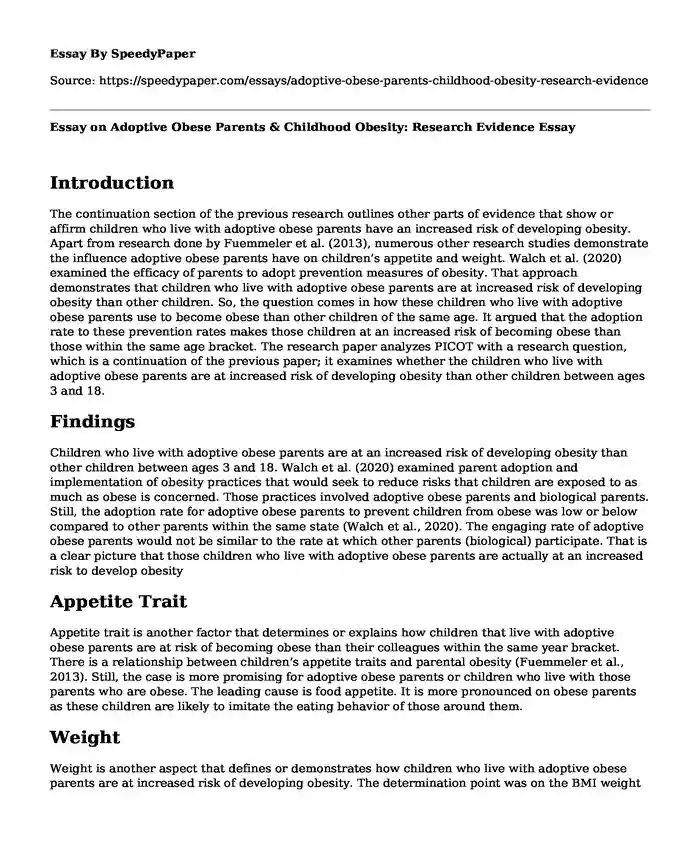
| Type of paper: | Essay |
| Categories: | Health and Social Care Medicine Food |
| Pages: | 3 |
| Wordcount: | 784 words |
Introduction
The continuation section of the previous research outlines other parts of evidence that show or affirm children who live with adoptive obese parents have an increased risk of developing obesity. Apart from research done by Fuemmeler et al. (2013), numerous other research studies demonstrate the influence adoptive obese parents have on children’s appetite and weight. Walch et al. (2020) examined the efficacy of parents to adopt prevention measures of obesity. That approach demonstrates that children who live with adoptive obese parents are at increased risk of developing obesity than other children. So, the question comes in how these children who live with adoptive obese parents use to become obese than other children of the same age. It argued that the adoption rate to these prevention rates makes those children at an increased risk of becoming obese than those within the same age bracket. The research paper analyzes PICOT with a research question, which is a continuation of the previous paper; it examines whether the children who live with adoptive obese parents are at increased risk of developing obesity than other children between ages 3 and 18.
Findings
Children who live with adoptive obese parents are at an increased risk of developing obesity than other children between ages 3 and 18. Walch et al. (2020) examined parent adoption and implementation of obesity practices that would seek to reduce risks that children are exposed to as much as obese is concerned. Those practices involved adoptive obese parents and biological parents. Still, the adoption rate for adoptive obese parents to prevent children from obese was low or below compared to other parents within the same state (Walch et al., 2020). The engaging rate of adoptive obese parents would not be similar to the rate at which other parents (biological) participate. That is a clear picture that those children who live with adoptive obese parents are actually at an increased risk to develop obesity
Appetite Trait
Appetite trait is another factor that determines or explains how children that live with adoptive obese parents are at risk of becoming obese than their colleagues within the same year bracket. There is a relationship between children’s appetite traits and parental obesity (Fuemmeler et al., 2013). Still, the case is more promising for adoptive obese parents or children who live with those parents who are obese. The leading cause is food appetite. It is more pronounced on obese parents as these children are likely to imitate the eating behavior of those around them.
Weight
Weight is another aspect that defines or demonstrates how children who live with adoptive obese parents are at increased risk of developing obesity. The determination point was on the BMI weight of those children, which showed a high BMI score. Children who live with adoptive obese parents are at risk of developing obesity because their BMI score is slightly higher (Smith et al., 2020). The trouble was even worse in cases where two adoptive parents were obese. It was even worse because the increasing traits could become too much, and children were likely to adopt it faster than their peers within the same age bracket (An et al., 2020). The exposure to cope with parents’ behavior is another impact that makes these children be at that risk. So, weight demonstrates or supports the argument over in the research question.
Conclusion
In conclusion, children who live with adoptive obese parents are at risk of developing obesity because they can adopt the appetite trait and increased their weight. In the case of appetite trait, the BMI of children who live with two adoptive obese parents is at a greater risk of developing obesity. It is the case because they imitate what is around them like sleeping patterns and other traits.
References
An, R., Xiang, X., Xu, N., & Shen, J. (2020). Influence of Grandparental Child Care on Childhood Obesity: A Systematic Review and Meta-Analysis. Childhood Obesity, 16(3), 141-153. https://www.liebertpub.com/doi/full/10.1089/chi.2019.0246
Fuemmeler, B. F., Lovelady, C. A., Zucker, N. L., & Østbye, T. (2013). Parental obesity moderates the relationship between childhood appetitive traits and weight. Obesity, 21(4), 815-823. https://onlinelibrary.wiley.com/doi/full/10.1002/oby.20144
Smith, K. E., Haedt-Matt, A., Mason, T. B., Wang, S., Yang, C. H., Unick, J. L., ... & Goldschmidt, A. B. (2020). Associations between naturalistically assessed physical activity patterns, affect and eating in youth with overweight and obesity. Journal of Behavioral Medicine. https://link.springer.com/article/10.1007%2Fs10865-020-00152-3
Walch, T. J., Rosenkranz, R. R., Schenkelberg, M. A., Fees, B. S., & Dzewaltowski, D. A. (2020). Parent adoption and implementation of obesity prevention practices through building children's asking skills at family child care homes. Evaluation and Program Planning, 101810. https://onlinelibrary.wiley.com/doi/full/10.1002/oby.20144
Cite this page
Essay on Adoptive Obese Parents & Childhood Obesity: Research Evidence. (2023, Nov 27). Retrieved from https://speedypaper.net/essays/adoptive-obese-parents-childhood-obesity-research-evidence
Request Removal
If you are the original author of this essay and no longer wish to have it published on the SpeedyPaper website, please click below to request its removal:
- Essay Example on Therapist Ethics Violations
- Health Disparity Essay Sample: Diabetes amongst Latino Population in the United States
- Paper Sample: The American Healthcare Delivery System
- Essay Sample on Cell Phone Technology
- Sampling Method and Study Design - Free Essay
- Discuss a Quote and Political Issues: What Does The Quote Mean? Essay Example
- Why People Choose Water Over Diet Soda - Paper Sample
Popular categories




